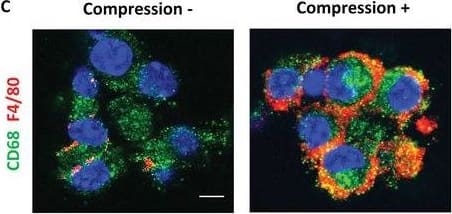Mouse CD68/SR-D1 Antibody Summary
Asp21-Pro282
Accession # P31996
Applications
Please Note: Optimal dilutions should be determined by each laboratory for each application. General Protocols are available in the Technical Information section on our website.
Scientific Data
 View Larger
View Larger
CD68/SR‑D1 in RAW 264.7 and NIH-3T3 Mouse Cell Lines. CD68/SR-D1 was detected in immersion fixed RAW 264.7 mouse monocyte/macrophage cell line (positive stain) and NIH-3T3 mouse embryonic fibroblast cell line (negative stain) using Rabbit Anti-Mouse CD68/SR-D1 Monoclonal Antibody (Catalog # MAB10114) at 3 µg/mL for 3 hours at room temperature. Cells were stained using the NorthernLights™ 557-conjugated Anti-Rabbit IgG Secondary Antibody (red; Catalog # NL004) and counterstained with DAPI (blue). Specific staining was localized to cytoplasm. View our protocol for Fluorescent ICC Staining of Non-adherent Cells.
 View Larger
View Larger
Detection of CD68 in Raw264.7 Mouse Cell line by Flow Cytometry. Raw264.7 mouse cell line was stained with Rabbit Anti-Mouse CD68 Monoclonal Antibody (Catalog # MAB10114, filled histogram) or Normal Rabbit IgG Control (Catalog # MAB1050, open histogram) followed by Phycoerythrin-conjugated Anti-Rabbit IgG Secondary Antibody (Catalog # F0110). To facilitate intracellular staining, cells were fixed with Flow Cytometry Fixation Buffer (1x) (Catalog # FC004) and permeabilized with ice-cold methanol. View our protocol for Staining Intracellular Molecules.
 View Larger
View Larger
Detection of Mouse CD68/SR-D1 by Immunohistochemistry Mechanical compression stimulated piezo‐type mechanosensitive ion channel component 1 (PIEZO1) signaling for CD68+F4/80+ macrophages differentiation in whole periosteal cells (WPCs) and bone marrow‐derived macrophages (BMDMs). A–I) Primary WPCs or BMDMs were harvested from WT mice and subjected to 10 or 0 kPa of mechanical compression. A) mRNA expression of Cd68 and adhesion G protein‐coupled receptor E1 (Adgre1) by RT‐qPCR in WPCs after compression. B) mRNA expression of Adgre1 in BMDMs after compression. C) Immunofluorescent staining of CD68+ (green) and F4/80+ (red) cells in BMDMs after compression. Blue indicates DAPI staining of nuclei. Scale bar, 5 µm. D,E) mRNA expression of colony‐stimulating factor 1 (Csf1) in WPCs and BMDMs after compression, respectively. F,G) mRNA expression of Piezo1 in WPCs and BMDMs after compression, respectively. H,I) BMDMs were pretreated with the PIEZO1 inhibitor GsMTx4 or vehicle for 24 h before compression. H) mRNA expression of Csf1 and Adgre1 in BMDMs after compression. I) Immunofluorescent staining of CD68+ (green) and F4/80+ (red) cells after compression. Blue indicates DAPI staining of nuclei. Scale bar, 5 µm. Data are presented as mean ± SEM. n = 3 per group. A,B,D–G) * p < 0.05 compared with 0 kPa. Statistical significance was determined by unpaired, two‐tailed Student's t‐test. H) *p < 0.05 compared with vehicle 10‐kPa compression group; †p < 0.05. Statistical significance was determined by two‐way ANOVA with Bonferroni post hoc test. Image collected and cropped by CiteAb from the following open publication (https://pubmed.ncbi.nlm.nih.gov/34854257), licensed under a CC-BY license. Not internally tested by R&D Systems.
Reconstitution Calculator
Preparation and Storage
- 12 months from date of receipt, -20 to -70 °C as supplied.
- 1 month, 2 to 8 °C under sterile conditions after reconstitution.
- 6 months, -20 to -70 °C under sterile conditions after reconstitution.
Background: CD68/SR-D1
Macrosialin (CD68) is a macrophage-restricted glycosylated transmembrane protein. It belongs to the lamp family and carries out specialized functions in dedicated phagocytic cells. Macrosialin binds to tissue- and organ-specific lectins to allow homing of macrophages to specific targets. Its presence in macrophages is useful in diagnosing conditions related to proliferation or abnormality of these cells.
Product Datasheets
FAQs
No product specific FAQs exist for this product, however you may
View all Antibody FAQsReviews for Mouse CD68/SR-D1 Antibody
There are currently no reviews for this product. Be the first to review Mouse CD68/SR-D1 Antibody and earn rewards!
Have you used Mouse CD68/SR-D1 Antibody?
Submit a review and receive an Amazon gift card.
$25/€18/£15/$25CAN/¥75 Yuan/¥2500 Yen for a review with an image
$10/€7/£6/$10 CAD/¥70 Yuan/¥1110 Yen for a review without an image

